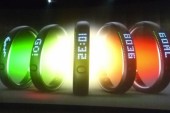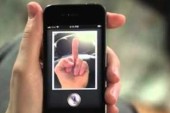
Though it may seem hard to believe from time to time when watching the current Republican primaries, there is a difference between journalism and theatre. On the face of it, journalism is there to inform, theatre to entertain. Beneath the surface, where many artists live, you’ll often hear talk about theatre, like novels and poetry — getting at the greater or purer truths. The baby carriage scene in Saved didn’t actually happen, but, the argument goes, it says more about the brutality of mid-20th-century British life and the banality of evil in the wake of the Second World War than any piece of journalism could.
Let’s say that’s true (although John Hersey and Hannah Arendt are pretty strong arguments it’s not); Mike Daisey’s still a charlatan. He’s a good-hearted charlatan, maybe; a lefty huckster to warm ones cockles with his counterintuitive but-you-just-know-it-had-to-be-true-remember-Nike? stories about the Apple factories in China, the poison gas, the underage workers, the man crippled in an iPad accident being shown a working tablet for the first time and declaring it to be like magic. But he can’t hide behind theatre.
Read more: Christopher Hitchens was a Journalist
Read more: The Ethics of Aggregation
Read more: A Sensational BBC Interview, Off the Rails
He’s trying, though. “What I do is not journalism,” he wrote on his site today, after the American radio show This American Life retracted their podcast of an excerpt of his “play,” and announced they’re devoting their next show to the issue of Daisey’s dishonesty and their own regret at broadcasting it. ”The tools of the theater,” he writes, “are not the same as the tools of journalism.”
The tools are indeed different: synecdoche, hyperbole, pathetic fallacy all help playwrights tell their stories, and none of those is an especially straight arrow in a journalist’s quiver. But the premise of that deeper-truth argument for art is that, once you discount all the stuff that isn’t factually true, what you’re left with is actually of the greatest value. Caesar didn’t say “Et tu Bruté?”, but what we get about betrayal, pathos and how wrong good and even noble intentions can go is far more precious, and even useful, than any archaeological interest in ancient Roman dialogue.
But what’s left after you strip away the falsehoods in Daisey’s work? The whole point of the piece, the brand that Daisey’s built his popular and presumably profitable enterprise on is the fact that he, an Apple-lover, went to China and had the veil yoinked from his eyes. He came face to face with the leviathan of modern industry and was appalled, and he’s come back to tell us that our iPhone’s are tinged with blood, our MacBook Air’s bear the weight of the misery of thousands.
Except, as we learned today, he did not come face to face with that at all. He may have been alarmed at industry on such a scale, as Naomi Klein and others were before him. But he evidently did not find too much compelling evidence to make his case that it was truly horrifying, the kind of horrifying that puts bums in seats and investigative playwrights in front of cameras.
So he made them up.
As we now know, from interviews with a translator he used but refused This American Life access to, there was no man crippled by the iPad, there was no gas leak, and if there were underage workers, he doesn’t seem to have actually found them.
Journalists have gone and looked into things at Foxconn and elsewhere, and they’ve come up with some good stuff, enough to make Apple reconsider its operations. And look, ma, no theatrical interventions required.
“I stand by my work,” Daisey says. “My show is a theatrical piece whose goal is to create a human connection between our gorgeous devices and the brutal circumstances from which they emerge. It uses a combination of fact, memoir, and dramatic license to tell its story, and I believe it does so with integrity.”
His only regret, he says, is allowing This American Life to broadcast that podcast excerpt as journalism. We all have our regrets, of course. But I think I’d have a few more if I were him, like lying to the show’s fact-checkers about his translator’s name and telling them her phone number was out of service so they couldn’t check his facts. Journalists report, artists borrow, geniuses steal. Daisey just lies.
________
Bert Archer writes about media and real estate for Toronto Standard. Follow him on Twitter @bertarcher.
For more, follow us on Twitter at @TorontoStandard, or subscribe to our newsletter.














